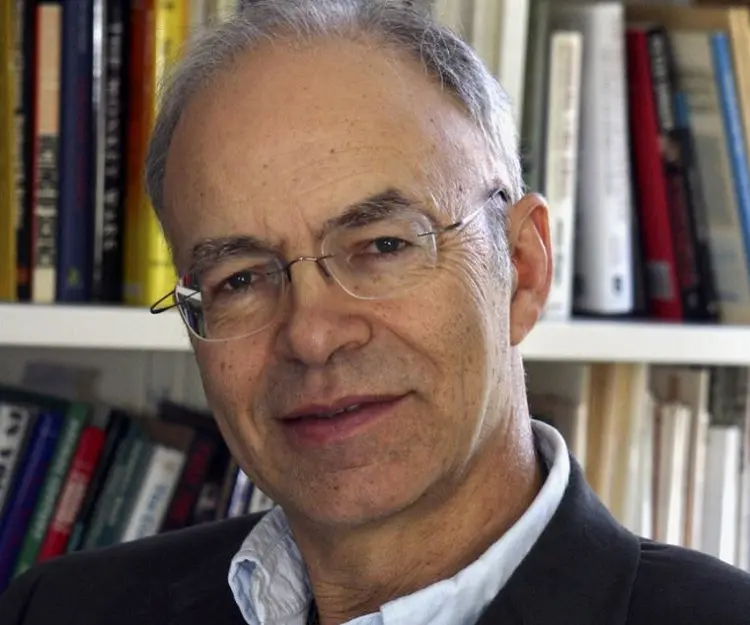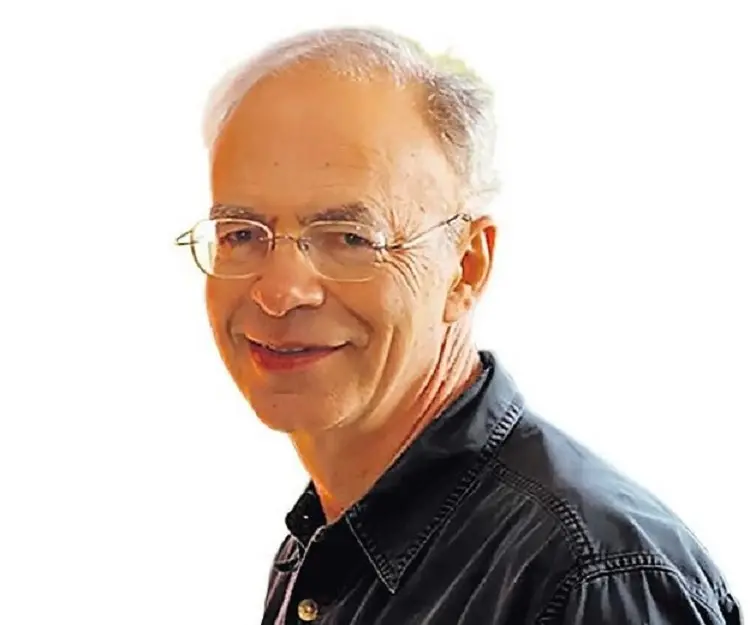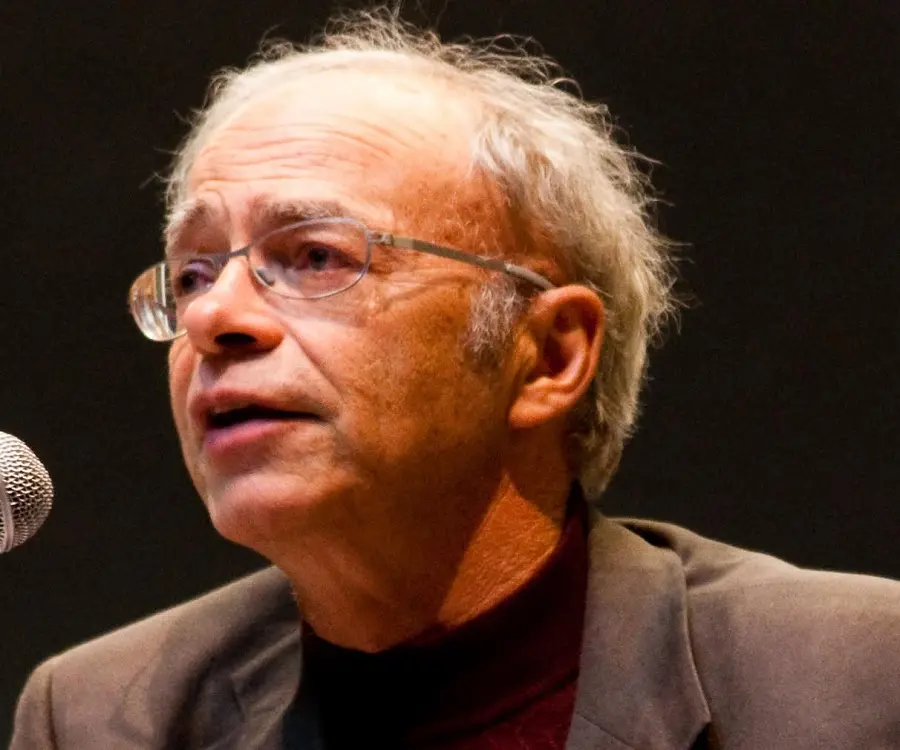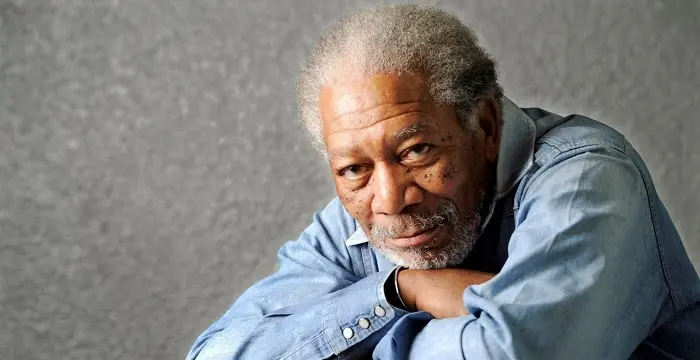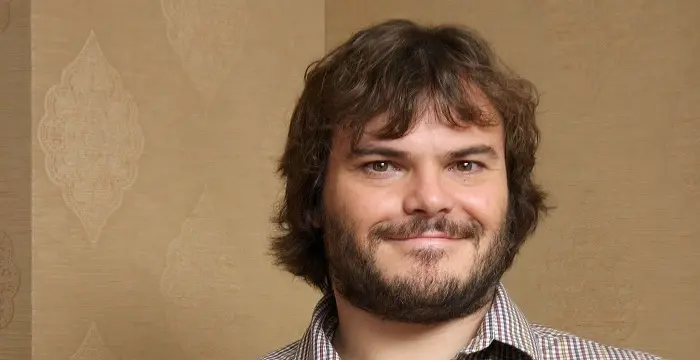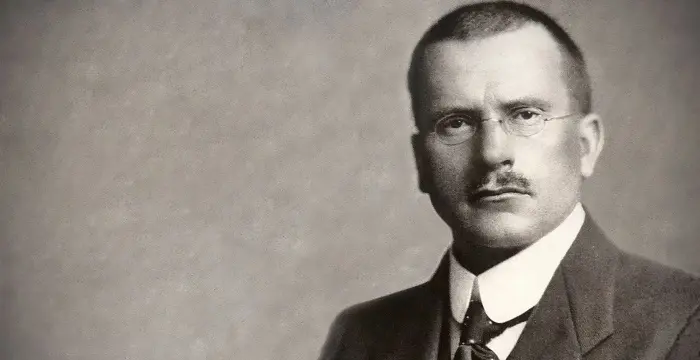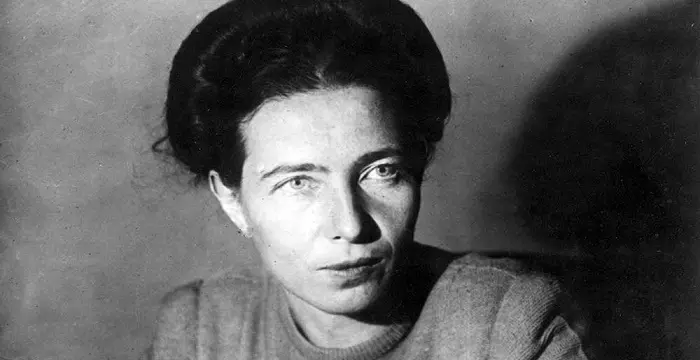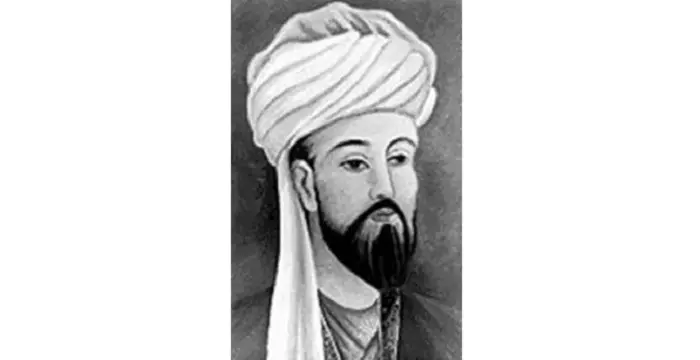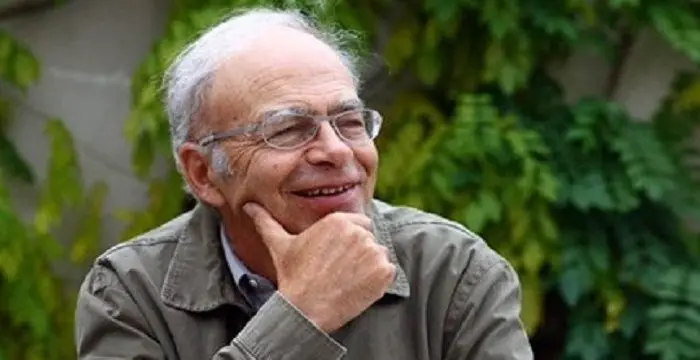
Peter Singer - Intellectuals & Academics, Timeline and Childhood
Peter Singer's Personal Details
Peter Singer is an Australian moral philosopher who has challenged traditional notions of applied ethics throughout his philosophical and literary career
| Information | Detail |
|---|---|
| Birthday | July 6, 1946 |
| Nationality | Australian |
| Famous | Atheists, Oxford University, University Of Melbourne, Intellectuals & Academics, Philosophers |
| Spouses | Renata Singer (m. 1968) |
| Siblings | Joan Dwyer |
| Known as | Peter Albert David Singer |
| Childrens | Esther Singer, Marion Singer, Ruth Singer |
| Universities |
|
| Notable Alumnis |
|
| Birth Place | Melbourne, Victoria, Australia |
| Religion | Jewish |
| Height | 185 |
| Gender | Male |
| Father | Ernst Singer |
| Mother | Cora Singer |
| Sun Sign | Cancer |
| Born in | Melbourne, Victoria, Australia |
| Famous as | Philosopher |
// Famous Oxford University
Rupert Murdoch
Rupert Murdoch is a renowned Australian business magnate famous for his establishment, ‘News Corporation’ in the US. Read on for detailed information about his childhood, profile, career and timeline
John Donne
John Donne was a famous English poet, satirist, lawyer and priest of his time. Check out this biography to know about his childhood, family life, achievements and other facts related to his life.
Michael York
Michael York is a famous English actor who has enjoyed a busy and varied career in both, television and film. Explore this biography to learn more about his profile, childhood, life and timeline.
Peter Singer's photo
Who is Peter Singer?
Peter Albert David Singer is a world famous Australian-born Jewish moral philosopher who has, in his career of almost three decades, challenged the traditional ideas of ethics and formed new foundations for a revolutionary applied ethical behavior. He is renowned for giving the animal rights movement all over the world an intellectual and philosophical nudge. He is considered to be a controversial figure in the realm of moral ethics because of his radical thinking like considering human-animal intercourse ethical as long as the animal is not harmed in the process, justifying killing handicapped infants, etc. Such radical thoughts have caused Singer a lot of social stigma and dishonor. Nonetheless, his contribution to the world of applied ethics has been well justified with accolades like, receiving prestigious professorship with Princeton University and being made a Companion of the Order of Australia in 2012. He was on the Time magazine’s 2009 list of “The 100 Most Influential People in the World” and was voted as one of Australia's ten most influential public intellectuals. Singer serves on the advisory board of Academics Stand Against Poverty (ASAP) and on the Advisory Board of Incentives for Global Health, the NGO formed to develop the Health Impact Fund proposal.
// Famous Atheists
Morgan Freeman
Morgan Freeman is an Academy Award winning actor known for his work in movies like ‘Street Smart’, ‘Driving Miss Daisy’ and ‘Million Dollar Baby’. This biography provides detailed information about his childhood, life, achievements, works & timeline.
Robert Smith
Robert Smith is an English musician and the lead singer of the British rock band, ‘The Cure.’ This biography of Robert Smith gives detailed information on his profile, childhood, life and timeline.
Jack Black
Jack Black is a renowned American actor-producer and voice artist. Explore this biography to learn more about his profile, childhood, career and timeline
Childhood & Early Life
Peter Singer was born in Melbourne, Australia after his Viennese Jewish parents immigrated to Australia. His father was an exporter of tea while his mother was a doctor. Singer’s family had a violent history of their ancestors dying in concentration camps.
To attain formal education, Singer attended Preshil School and Scotch College. He did his BA degree from the University of Melbourne in law, history and philosophy in 1967 and completed his MA from the same university in 1969.
He went to the University of Oxford on a scholarship and earned his B.Phil in 1971; he did a thesis on civil disobedience, which was published as a book in 1973, titled ‘Democracy and Disobedience’.
Career
Singer published an article in 1971, ‘Famine, Affluence and Morality’, one of his most famous philosophical essays. In the essay, he has discussed how and why people should make charities and save the people who are dying of starvation.
In 1975, Singers’ book ‘Animal Liberation’ came out in which he talked about animal welfare and how we practice ‘speciesism’ in our modern culture. In his book he supported the concept of vegetarianism and veganism.
During the same time, he was appointed as a Radcliffe lecturer at University College, Oxford and was also an active visiting faculty at the New York University. He went back to Melbourne after some time and spent most of his literary career there.
From 1976-1981, Singer published works like: ‘Animal Rights and Human Obligations: An Anthology’ (1976), ‘Practical Ethics’ (1979), ‘Marx: A Very Short Introduction’ (1980), ‘Animal Factories’ (1980), ‘The Expanding Circle: Ethics and Sociobiology’ (1981).
He was made the chair of philosophy at the Monash University in 1977, where he also became the first director of the Centre for Human Bioethics. Later, he founded the International Association of Bioethics.
From 1982–1985, his published work included: ‘Hegel’ (1982), ‘Test-Tube Babies: a guide to moral questions, present techniques and future possibilities’ (1982), ‘The Reproduction Revolution: New Ways of Making Babies’ (1985) , and ‘Should the Baby Live?: The Problem of Handicapped Infants’.
Some of his major writings during the period 1986–1995 include: ‘Ethical and Legal Issues in Guardianship Options for Intellectually Disadvantaged People’ (1986), ‘Animal Liberation: A Graphic Guide’ (1987), ‘A Companion to Ethics’ (1991), ‘Save the Animals!’ (1991), ‘Embryo Experimentation’ (1993), and ‘The Great Ape Project: Equality Beyond Humanity’ (1995).
In 1993, Singer came out with his ‘How Are We to Live? : Ethics in an Age of Self-Interest’. The book goes through history of ethical thought and discusses the selfishness and the meaning of living life ethically and applying it to daily life.
In 1996, he ran as a Green candidate for the Australian Senate but was unsuccessful. Also, around that time he wrote ‘Rethinking Life and Death: The Collapse of Our Traditional Ethics’, ‘The Greens’, ‘The Allocation of Health Care Resources’, etc.
In 1999, Singer was appointed as the Professor of Bioethics, University Centre for Human Value, Princeton University but due to his stand on bioethical issues, he was considered controversial in American, therefore his appointment had to be justified at the time.
In 2000, Peter's book ‘A Darwinian Left: Politics, Evolution and Cooperation’ was published. In this a book he argued that the evolutionary psychology is attuned with and should be integrated into the left ideological structure.
In 2004, he was recognized as the Australian humanist of the year by the Council of Australian Humanist Societies in 2004. His writings during this time were: ‘Unsanctifying Human Life’, ‘How Ethical is Australia? : An Examination of Australia’s Record as a Global Citizen’, etc.
In 2008, he became a part of the film and book ‘Examined Life: Excursions with Contemporary Thinkers’. The movie featured eight philosophers and was directed by Astra Taylor. Singer talked about ethics from Fifth Avenue, New York City.
In 2009, he wrote and published ‘The Life You Can Save: Acting Now to End World Poverty’. In the book he discussed the growing world poverty when for the first time in humanity we have the finances the and material to eradicate it completely.
Major Works
In 1979, Singer published ‘Practical Ethics’, which is considered as one of his most wide-ranged works. He has discussed the various interests of the livings beings in details and the quality of a human being to invariably avoid pain.
‘How Are We to Live?: Ethics in an Age of Self-Interest’ published in 1993 is amongst Singer’s popular philosophical writings, delving into the quest of finding a reasonable ethical structure in today’s scenario.
In 2009, ‘The Life You Can Save: Acting Now to End World Poverty’ became one of his most comprehensive humanitarian writings, discussing the immorality of today’s generation in not coming together and eradicating poverty.
Awards & Achievements
He was in Time magazine's 2009 list of “The 100 Most Influential People in the World”.
In 2012, Singer was named as a Companion of the Order of Australia for his work in the field of philosophy and bioethics. He received this honor for leading the public debate on the topics of poverty, animal welfare and human condition.
Trivia
Singer donates 25 percent of his salary to Oxfam and UNICEF and he is a member of ‘Giving What We Can’, an international society for the promotion of poverty relief.
He wrote a book with the physician Deanne Wells on the surrogate motherhood. He believes that it should be allowed and regulated by the state by establishing non-profit 'State Surrogacy Boards'.
He is a vegetarian since 1971 and is increasingly becoming vegan.
Steve Forbes, an American publisher, stopped his aid to Princeton University in 1999 because of Singer's appointment to a prominent professorship.
Singer’s work has been a subject of protests and controversy in Germany in the late 80s.
// Famous Intellectuals & Academics
Bertil Gotthard Ohlin
Bertil Gotthard Ohlin was a famous Swedish economist. This biography profiles his childhood, family life & achievements.
Emily Greene Balch
Emily Greene Balch was an American economist, sociologist and pacifist who won the 1946 Nobel Peace Prize. This biography of Emily Greene Balch provides detailed information about her childhood, life, achievements, works & timeline.
Martin Buber
One of the greatest philosophers to have ever walked on earth, Martin Buber contributions to philosophy is a long-standing one. Explore all about his profile, childhood, life and timeline here.
Peter Singer biography timelines
- // 6th Jul 1946Peter Singer was born in Melbourne, Australia after his Viennese Jewish parents immigrated to Australia. His father was an exporter of tea while his mother was a doctor. Singer’s family had a violent history of their ancestors dying in concentration camps.
- // 1967To attain formal education, Singer attended Preshil School and Scotch College. He did his BA degree from the University of Melbourne in law, history and philosophy in 1967 and completed his MA from the same university in 1969.
- // 1971He went to the University of Oxford on a scholarship and earned his B.Phil in 1971; he did a thesis on civil disobedience, which was published as a book in 1973, titled ‘Democracy and Disobedience’.
- // 1971Singer published an article in 1971, ‘Famine, Affluence and Morality’, one of his most famous philosophical essays. In the essay, he has discussed how and why people should make charities and save the people who are dying of starvation.
- // 1975In 1975, Singers’ book ‘Animal Liberation’ came out in which he talked about animal welfare and how we practice ‘speciesism’ in our modern culture. In his book he supported the concept of vegetarianism and veganism.
- // 1976 To 1981From 1976-1981, Singer published works like: ‘Animal Rights and Human Obligations: An Anthology’ (1976), ‘Practical Ethics’ (1979), ‘Marx: A Very Short Introduction’ (1980), ‘Animal Factories’ (1980), ‘The Expanding Circle: Ethics and Sociobiology’ (1981).
- // 1977He was made the chair of philosophy at the Monash University in 1977, where he also became the first director of the Centre for Human Bioethics. Later, he founded the International Association of Bioethics.
- // 1979In 1979, Singer published ‘Practical Ethics’, which is considered as one of his most wide-ranged works. He has discussed the various interests of the livings beings in details and the quality of a human being to invariably avoid pain.
- // 1982 To 1985From 1982–1985, his published work included: ‘Hegel’ (1982), ‘Test-Tube Babies: a guide to moral questions, present techniques and future possibilities’ (1982), ‘The Reproduction Revolution: New Ways of Making Babies’ (1985) , and ‘Should the Baby Live?: The Problem of Handicapped Infants’.
- // 1986 To 1995Some of his major writings during the period 1986–1995 include: ‘Ethical and Legal Issues in Guardianship Options for Intellectually Disadvantaged People’ (1986), ‘Animal Liberation: A Graphic Guide’ (1987), ‘A Companion to Ethics’ (1991), ‘Save the Animals!’ (1991), ‘Embryo Experimentation’ (1993), and ‘The Great Ape Project: Equality Beyond Humanity’ (1995).
- // 1993In 1993, Singer came out with his ‘How Are We to Live? : Ethics in an Age of Self-Interest’. The book goes through history of ethical thought and discusses the selfishness and the meaning of living life ethically and applying it to daily life.
- // 1993‘How Are We to Live?: Ethics in an Age of Self-Interest’ published in 1993 is amongst Singer’s popular philosophical writings, delving into the quest of finding a reasonable ethical structure in today’s scenario.
- // 1996In 1996, he ran as a Green candidate for the Australian Senate but was unsuccessful. Also, around that time he wrote ‘Rethinking Life and Death: The Collapse of Our Traditional Ethics’, ‘The Greens’, ‘The Allocation of Health Care Resources’, etc.
- // 1999In 1999, Singer was appointed as the Professor of Bioethics, University Centre for Human Value, Princeton University but due to his stand on bioethical issues, he was considered controversial in American, therefore his appointment had to be justified at the time.
- // 2000In 2000, Peter's book ‘A Darwinian Left: Politics, Evolution and Cooperation’ was published. In this a book he argued that the evolutionary psychology is attuned with and should be integrated into the left ideological structure.
- // 2004In 2004, he was recognized as the Australian humanist of the year by the Council of Australian Humanist Societies in 2004. His writings during this time were: ‘Unsanctifying Human Life’, ‘How Ethical is Australia? : An Examination of Australia’s Record as a Global Citizen’, etc.
- // 2008In 2008, he became a part of the film and book ‘Examined Life: Excursions with Contemporary Thinkers’. The movie featured eight philosophers and was directed by Astra Taylor. Singer talked about ethics from Fifth Avenue, New York City.
- // 2009In 2009, he wrote and published ‘The Life You Can Save: Acting Now to End World Poverty’. In the book he discussed the growing world poverty when for the first time in humanity we have the finances the and material to eradicate it completely.
- // 2009In 2009, ‘The Life You Can Save: Acting Now to End World Poverty’ became one of his most comprehensive humanitarian writings, discussing the immorality of today’s generation in not coming together and eradicating poverty.
- // 2009He was in Time magazine's 2009 list of “The 100 Most Influential People in the World”.
- // 2012In 2012, Singer was named as a Companion of the Order of Australia for his work in the field of philosophy and bioethics. He received this honor for leading the public debate on the topics of poverty, animal welfare and human condition.
// Famous Philosophers
Martin Buber
One of the greatest philosophers to have ever walked on earth, Martin Buber contributions to philosophy is a long-standing one. Explore all about his profile, childhood, life and timeline here.
Lao Tzu (Laozi)
Lao Tzu was a legendary Chinese philosopher who wrote the important “Daodejing”. This biography profiles his childhood, life, career, achievements and timeline.
Alan Watts
Alan Watts was a famous British philosopher known for his Zen teachings and interpretations of Eastern philosophy. Read more about this great philosopher in the following article.
Carl Jung
Carl Jung was a Swiss psychiatrist famous for founding the school of analytical psychology. This biography of Carl Jung provides detailed information about his childhood, life, achievements, works & timeline.
Simone de Beauvoir
Simone de Beauvoir was an eminent French writer, intellectual, activist, and philosopher. This biography profiles her childhood, life, thoughts, achievements and timeline.
Jabir Ibn Hayyan
Jabir Ibn Hayyan was a medieval era polymath. Check out this biography to know about his life, works and achievements.
Peter Singer's FAQ
What is Peter Singer birthday?
Peter Singer was born at 1946-07-06
Where is Peter Singer's birth place?
Peter Singer was born in Melbourne, Victoria, Australia
What is Peter Singer nationalities?
Peter Singer's nationalities is Australian
Who is Peter Singer spouses?
Peter Singer's spouses is Renata Singer (m. 1968)
Who is Peter Singer siblings?
Peter Singer's siblings is Joan Dwyer
Who is Peter Singer childrens?
Peter Singer's childrens is Esther Singer, Marion Singer, Ruth Singer
What was Peter Singer universities?
Peter Singer studied at Oxford University,University Of Melbourne, Scotch College, Melbourne, University College, Oxford, University of Melbourne, University of Oxford
What was Peter Singer notable alumnis?
Peter Singer's notable alumnis is Oxford University, University Of Melbourne
What is Peter Singer's religion?
Peter Singer's religion is Jewish
How tall is Peter Singer?
Peter Singer's height is 185
Who is Peter Singer's father?
Peter Singer's father is Ernst Singer
Who is Peter Singer's mother?
Peter Singer's mother is Cora Singer
What is Peter Singer's sun sign?
Peter Singer is Cancer
How famous is Peter Singer?
Peter Singer is famouse as Philosopher



